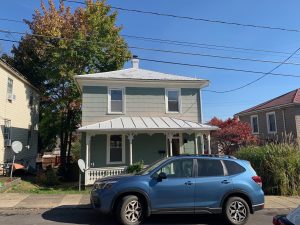It turns out that the house isn’t to be mine, after all, and I’m okay with that.
The inspection was Saturday afternoon, and my Realtor and I both went so we could see what the inspector found. I also wanted to take pictures and measurements. This meant that I was spending nearly two hours in the place. While I was seeing things I liked about it, I was also seeing some things I found a little unsettling. One of those was the house next door. When I looked out one of the upstairs windows that faced that house, I could see that it was in really bad shape, with holes in the outside walls, including one up under the eaves. My inspector even glanced over there and commented on it. They probably have a colony of either squirrels, raccoons, or bats living in that attic.
I also started noticing how narrow the doors were. In my online furniture shopping, I’d seen that they had a note about how the doorway had to be at least 32 inches for them to deliver a sofa, and when I measured I found that the front door and the living room door were only 31 inches wide. They must have had to deliver everything through the back door, which was wider, but which required going up some pretty steep steps from the deck. I noticed that the section of fence between the side yard and back yard by that part of the deck had been removed and was leaning against the side fence.
The inspection report wasn’t utterly alarming. The biggest worry for me was the fact that the roof was original to the house, which was built in 1900. It’s a tin roof, so I guess it doesn’t wear out like modern shingles do, but a number of the tin panels are bent, so wind and water can get up under them. The inspector recommended getting a tin roof expert to look at it and see what needed to be repaired. The basement was just a crawl space, not an actual basement, though it did have things like the water heater and interior unit for the air conditioner and heater in there. The floor was dirt, and the dirt from when it was excavated was piled up against one of the walls. The inspector suggested getting the basement sealed to prevent mold, bugs, etc., from getting in. He also said the house needed new rain gutters. He thought the basement stairs and back stairs to the deck needed to be replaced and were too steep, so they were unsafe.
The thing that I found a bit concerning that I hadn’t even considered was that there’s a big tree on the neighbor’s side of the property line that’s too close to both houses. It’s just about at the back end of the houses, barely five feet from both houses. A lot of that tree’s branches hang over what would have been my house’s roof, and he said a tree that tall would have a root system that could encroach on my basement or undermine my foundation, and if that tree fell in a windstorm, depending on how it fell it would either fall between the houses, so the branches would hit what would have been my bedroom; it would fall away from both houses, so the roots would come up under the rear corner of my house; it would fall on the neighbor’s house so the roots would dig up my basement; or it would fall on my house. He suggested getting together with the neighbor to have the tree removed because a tree that size shouldn’t be within ten feet of a house.
Once the inspector left, my Realtor and I were walking around, looking at the things he pointed out. Her husband’s a contractor, so she knows a lot about how to get stuff like that done, and we were trying to figure out what we might be able to ask the seller to fix and how much it would cost to fix the other stuff. The tree was a big question mark because it’s on the neighbor’s property, and given the condition of that building, we weren’t sure I could get the neighbor to do anything. While we were standing outside, I smelled smoke and commented that someone had their fireplace going. Then my Realtor noticed smoke coming from near the house next door.
She looked and saw that the leaves on the ground in front of that house were burning, and there was a kid nearby. She went into Mom mode and ran over to make sure the kid was okay. He just looked at her, shrugged, and said, “I like starting fires.”
My Realtor looked at me and mouthed, “Oh, no.” We noted then that the house next door had been divided into apartments. That meant there was probably a non-resident landlord, and he clearly didn’t care for maintaining the place, so tracking him down to get the tree dealt with wouldn’t be easy. I might not even be able to get anything done if the tree actually fell on my place. I’d have to find out who the owner was and find a way to contact him. Beyond that, I wasn’t super keen on living next door to a poorly maintained apartment building that houses a kid who likes to start fires. Even aside from the fires, those houses have street parking (since they were built before cars were common), and if there are three families in one building, that means they take up a lot of parking. They were parked in front of what would have been my house, so I might not always have been able to park at my house.
The Realtor apologized for not having noticed all this before I paid for the inspection. She said I couldn’t cancel the contract based on the neighbors, but there was enough in the inspection report to give me grounds to back out. That was what I decided to do because the roof plus the gutters plus the basement, plus the steps, plus the tree added to the neighboring house and the kid who likes to start fires was all too much.
Oddly, this came as a huge relief. I did like a lot about the house. I’ve loved the idea of living in a Victorian home since I was a kid. But I think I was trying to force it. I was so eager about finding a place and getting that worry out of the way (since the market is pretty tight) that I jumped at something that would kind of work and ignored the vague sense of disappointment underlying it because it never felt right. I have this sense of my home in my head, and no matter how much I tried mentally arranging my furniture in this house and no matter how much online shopping I did for furnishings, I never managed to make this house the house in my head. The head house refused to be replaced, and I felt a sense of loss for not having the head house, if that makes any sense. The moment I had a good reason not to take this house, I felt so much better.
I learned so much from that inspection, though. I have a really good checklist of things to look for before I go so far as to make an offer. I know I need to spend a lot more time in the house before I decide. I need to walk the block and around to the block behind to get a sense of the neighborhood. I did drive down that street, but it’s a narrow street on a hill, so I didn’t notice the three mailboxes on the front of that house next door while I had my eyes on the road. I need to walk it to get a good sense of what’s there and what the neighborhood feels like. I’ve been driving around the neighborhoods I like at various times and had never considered this one, so I need to explore it a bit more.
This means I won’t be having to move right away, so I need to buckle down and work on my writing in the meantime. I’ll probably start the serious house hunting after Thanksgiving. I have until May to move out of this apartment, and I can always go month-to-month if I have to after that.


